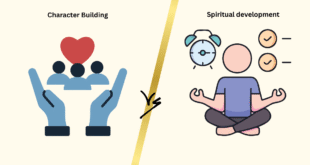Dr. Muhammad Younus Khalid- Parenting and Tarbiyah Coach
In today’s rapidly changing world, one of the most important qualities parents can nurture in their children is empathy, the ability to understand and share the feelings of others. Sadly, we see rising levels of selfishness, bullying, and emotional disconnection among young people. This makes encouraging empathy in children through Tarbiyah more crucial than ever.
Tarbiyah, an Arabic term deeply rooted in Islamic tradition, refers to holistic upbringing and nurturing, developing a child’s character, spirituality, emotional intelligence, and behavior. It goes beyond just providing physical care or academic education; it shapes the heart and soul of the child.
Empathy is at the core of Tarbiyah because it helps children build meaningful relationships, develop strong morals, and become compassionate members of society. In Islam, empathy is directly linked to mercy (rahmah), kindness (ihsan), and justice (adl), which are essential traits of a true believer.
In this guide, we’ll explore why empathy is vital for children, the Islamic foundation for teaching empathy, common parenting challenges, and practical strategies for encouraging empathy in children through Tarbiyah.
What is Empathy?
Empathy is the ability to sense, understand, and respond to the emotions of others. It goes beyond sympathy, which simply involves feeling sorry for someone. Empathy enables children to step into someone else’s shoes, see the world from their perspective, and act with compassion.
There are three main types of empathy:
- Cognitive Empathy – Understanding how someone else feels.
- Emotional Empathy – Feeling what another person is feeling.
- Compassionate Empathy – Taking action to help someone in need.
From an Islamic perspective, empathy is tied to the teachings of the Prophet Muhammad ﷺ, who was described in the Qur’an as a “mercy to all worlds” (Surah Al-Anbiya 21:107). His entire life was a model of empathetic behavior, whether comforting orphans, helping the poor, or advising companions with gentleness.
Why Empathy Matters in Child Development
-
Builds Strong Relationships
Children with empathy are better at forming healthy friendships. They can resolve conflicts peacefully and are less likely to engage in bullying.
-
Enhances Emotional Intelligence
Empathy helps kids identify their own feelings and those of others, which is critical for emotional growth and mental well-being.
-
Encourages Kindness and Generosity
Empathetic children naturally show kindness and are motivated to help others without expecting rewards.
-
Prevents Selfishness and Entitlement
In a world driven by consumerism and competition, empathy counters selfishness by fostering humility and gratitude.
-
Aligns with Islamic Values
Islam strongly emphasizes caring for others. Teaching empathy strengthens a child’s connection to their faith and builds a sense of accountability to Allah ﷻ.
The Role of Tarbiyah in Teaching Empathy
Tarbiyah is a comprehensive process of upbringing that focuses on nurturing a child’s mind, body, and soul. It involves guidance, discipline, love, and spiritual education.
When it comes to empathy, Tarbiyah provides a framework that:
- Connects empathy to worship and spirituality.
- Reinforces empathy through daily practices like Salah, dua, and acts of service.
- Helps children internalize empathy as part of their identity, not just a behavioral skill.
The Prophet Muhammad ﷺ was the best example of Tarbiyah. He nurtured his companions with care and mercy, treating even children with deep compassion. In one hadith, he said:
“He is not one of us who does not show mercy to our young ones and respect to our elders.”
(Sunan Abu Dawood)
This highlights how central empathy is in Islamic parenting.
Challenges Parents Face in Today’s World
Modern society presents unique barriers to encouraging empathy in children through Tarbiyah:
- Digital Distractions
Excessive screen time isolates children and limits real-world emotional connections. - Materialism and Consumerism
Children are bombarded with messages that promote self-centeredness rather than compassion. - Peer Pressure and Bullying
Kids may hide their empathy to fit in with peers who value toughness over kindness. - Busy Lifestyles
Many parents struggle to find time for deep conversations and spiritual nurturing. - Cultural Misunderstandings
In some families, expressing emotions is seen as weakness, which discourages empathetic behavior.
Understanding these challenges helps parents address them with intentional Tarbiyah strategies.
Practical Strategies for Encouraging Empathy in Children through Tarbiyah
Here are ten actionable steps parents can take:
-
Be a Role Model
Children imitate what they see. Show empathy in your daily interactions, listen attentively, speak kindly, and help others.
Example: If someone in the family is sick, show concern and involve your children in caring for them.
Use phrases like, “I wonder how your sister feels right now,” to model empathetic thinking.
-
Teach Empathy Through Qur’an and Sunnah
Share stories of the Prophets that highlight mercy and compassion:
- Prophet Muhammad ﷺ comforting orphans.
- Prophet Yusuf (AS) forgiving his brothers.
- Prophet Musa (AS) defending the oppressed.
Make these stories interactive by asking questions like, “How do you think the people felt in this situation?”
-
Encourage Active Listening
Teach children to listen without interrupting.
- Practice role-playing activities where one person shares a problem and the other listens with care.
- Highlight how listening is part of being a good Muslim.
-
Practice Perspective-Taking
Help children imagine what others might be feeling.
Example: If a friend is sad because they lost a toy, ask, “How would you feel if that happened to you?”
This strengthens cognitive empathy and emotional intelligence.
-
Foster Gratitude
Gratitude and empathy go hand in hand. When children appreciate what they have, they become more sensitive to the needs of others.
- Create a family gratitude journal.
- Encourage kids to say Alhamdulillah daily.
-
Involve Children in Service Projects
Practical acts of service instill deep empathy:
- Visiting orphanages or hospitals.
- Distributing food to the needy during Ramadan.
- Participating in community clean-ups.
This makes empathy a lived experience, not just a concept.
-
Limit Materialism
Reduce exposure to ads and unnecessary toys. Instead, focus on meaningful family activities that promote connection and understanding.
Islamic Approach: Teach children the concept of zuhd (contentment) and that true happiness lies in pleasing Allah, not in accumulating things.
-
Use Positive Reinforcement
Acknowledge and praise empathetic behavior:
- “I loved how you shared your snack with your brother.”
- “It was so kind of you to comfort your friend.”
This encourages children to repeat such actions.
-
Make Dua Together
Regularly make dua asking Allah to bless your family with compassionate hearts.
Example:
“O Allah, fill our hearts with love, mercy, and empathy for others.”
This connects empathy to spirituality.
-
Create a Family Culture of Tarbiyah
Establish routines that reflect Islamic values:
- Begin meals by thanking Allah and discussing blessings.
- End the day with reflection on acts of kindness.
- Hold weekly family meetings to discuss emotions and relationships.
Empathy Activities for Different Age Groups
Toddlers (2-4 years)
- Use simple words to label emotions: happy, sad, scared.
- Model sharing and turn-taking during playtime.
Young Children (5-8 years)
- Read Islamic storybooks about kindness and discuss characters’ feelings.
- Practice dua for others.
Pre-teens (9-12 years)
- Encourage journal writing about their feelings and others’ experiences.
- Involve them in family decision-making to build perspective.
Teenagers (13+ years)
- Engage in open discussions about global issues like poverty or injustice.
- Encourage volunteer work and mentorship roles.
The Role of Schools and Communities
Parents are not alone in this journey. Schools and Islamic centers play a vital role:
- Teachers can integrate empathy lessons into curriculum through Islamic studies and social-emotional learning.
- Mosques can organize youth programs focused on service and compassion.
- Community projects can unite families around shared values.
Long-term Benefits of Raising Empathetic Children
Children who grow up with empathy:
- Build healthier relationships in adulthood.
- Become leaders who value justice and fairness.
- Develop resilience and emotional strength.
- Serve as positive role models for future generations.
Ultimately, empathy shapes not only individual lives but entire communities.
Common Mistakes Parents Should Avoid
- Forcing Empathy – Empathy must come from the heart, not from pressure.
- Neglecting Emotional Needs – Children can’t show empathy if their own feelings are ignored.
- Over-rewarding Kindness – Avoid making empathy a tool for material gain.
- Failing to Model Behavior – Children will not internalize empathy if parents don’t practice it themselves.
Conclusion
Encouraging empathy in children through Tarbiyah is one of the greatest responsibilities of Muslim parents. By connecting empathy to faith, modeling compassionate behavior, and providing real-life opportunities for kindness, we can raise a generation that truly reflects the mercy of Islam.
The Prophet Muhammad ﷺ said:
“The merciful are shown mercy by The Most Merciful. Be merciful to those on the earth, and the One above the heavens will be merciful to you.”
(Tirmidhi)
May Allah ﷻ guide us to nurture our children with love, mercy, and understanding so they become sources of light and compassion in the world. Ameen.
 Edutarbiyah English Blog of Parenting and Tarbiyah
Edutarbiyah English Blog of Parenting and Tarbiyah




It¦s really a nice and helpful piece of information. I am satisfied that you shared this helpful info with us. Please keep us up to date like this. Thank you for sharing.